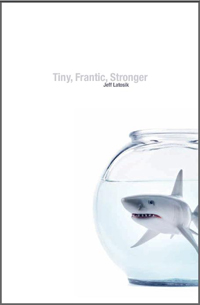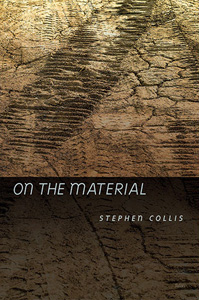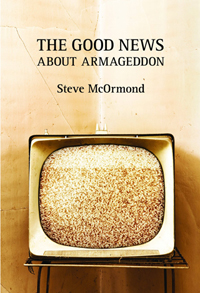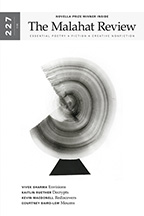Reviews
Poetry Reviews by Katia Grubisic
Stephen Collis, On the Material (Vancouver: Talonbooks, 2010). Paperbound, 128 pp., $17.95.
Jeff Latosik, Tiny, Frantic, Stronger (Toronto: Insomniac, 2010). Paperbound, 70 pp., $11.95.
Steve McOrmond, The Good News About Armageddon (London: Brick, 2010). Paperbound, 103 pp., $19.
In the event of an apocalypse (or the apocalypse, I suppose, though I doubt our species is wise enough to stop at one), there is one friend I know I’d like to bring along into the wilderness. She’s good in a crisis, good at bridging compassion and utility. Plus she has a dog; dogs will be key, in the event of an apocalypse. And, as Mark Twain said, outside of a dog, a book is a man’s best friend. Pick your doomsday authors wisely. Want some hope? Commiseration? Hunting tips? The collections reviewed here offer promising wordsmithery, and possible reading for the end of the world.
Jeff Latosik’s control over the momentary has garnered him publication and prizes,  and is present throughout Tiny, Frantic, Stronger, his first collection. Latosik has spoken of being attracted by poetry’s “smallness,” the verbal economy of its meanings. Tightly, the poems sit like beads inside themselves.
and is present throughout Tiny, Frantic, Stronger, his first collection. Latosik has spoken of being attracted by poetry’s “smallness,” the verbal economy of its meanings. Tightly, the poems sit like beads inside themselves.
A poem about Toronto’s island begins: “We were scared to swim because of what was down there. / We were down there.” Elsewhere, a girl is “back with gin on her dress.” There is pathos in “Two people / circling each other like goldfish.” Or consider the creepy and somehow logical allegiance of the “twenty-seven bones / in the human hand and twenty-seven billboards in a morning” in one of the book’s longer sequences.
Latosik’s surprising descriptions can make left field seem like where we wanted to be all along. In those captive moments, the poetic lens through which we—Latosik and his readers—look at the world disappears. No edges; certainly no thumb accidentally blobbing the view. But then? The island poem meanders into a weaker alternative to the opening’s latent threat: “Or, we counted everything that could be dumped / from our vast reservoirs of taste: magazines, subway ads, / Hollywood movies that bobbled like buoys in our conversation. ”
Diversion may be the way our world-wide-webby minds work now, but it makes for deflated poetry. The portrait of gin girl in “Helping” runs off in the same way, to end up in “The not-quite / push[ing] against us too”—the not-quite what? What has the poem earned? Yet Latosik’s poetic instincts are clearly in the right place. In “Doubt,” he wants fear as a balm, “As if worry could sling your mind’s arm,” but the thought fishtails into yoga, doodles, fragments. Wrong time for this art form? Is it even possible to comment on the failings of instant, superficial gratification without falling prey to it? Societal, pop-cultural buoys dot Tiny, Frantic, Stronger as denotation of clever contemporariness rather than providing us with a map of what will sink us, or offering something to hang on to. There is much under the surface here; Latosik’s work sparks, but his lack of rigour leaves us hoping that next time, “the bolts hold. The joists loosen. You get better.”
Four collections of poetry in, plus some chapbooks and a shelf or two of critical  work, Vancouver poet Stephen Collis is better—both softerspoken and surer of pen. But better is almost beside the point: deeper matters more, the whole, long undertaking of trying to represent in language the complicated simultaneity of reference and inference. “Limits,” Collis writes, “are what we are combined of / But there there is a boundary / There is also a beyondery / Like I-fought-the-lyric-and-the-lyric-won.” He’s still in the ring, don’t worry. On the Material sees Collis flex expression over possession. Perhaps it’s no accident that most of this collection was written during travels, as Collis mentions in the afterword; in movement, the self is almost immaterial, rendered entirely from context, the with-whom and the where-from. In many of the pieces, the context seems bleak, the corporeality of the text barely providing protection from the hollow materialism of our “pulp and paper planet.” I liked it better when experimental poets were suspicious of language; consumerism can seem too easy a target, and besides, there’s something demoralizing when condos and SUVs are overwhelming to those who took on the very structure of meaning.
work, Vancouver poet Stephen Collis is better—both softerspoken and surer of pen. But better is almost beside the point: deeper matters more, the whole, long undertaking of trying to represent in language the complicated simultaneity of reference and inference. “Limits,” Collis writes, “are what we are combined of / But there there is a boundary / There is also a beyondery / Like I-fought-the-lyric-and-the-lyric-won.” He’s still in the ring, don’t worry. On the Material sees Collis flex expression over possession. Perhaps it’s no accident that most of this collection was written during travels, as Collis mentions in the afterword; in movement, the self is almost immaterial, rendered entirely from context, the with-whom and the where-from. In many of the pieces, the context seems bleak, the corporeality of the text barely providing protection from the hollow materialism of our “pulp and paper planet.” I liked it better when experimental poets were suspicious of language; consumerism can seem too easy a target, and besides, there’s something demoralizing when condos and SUVs are overwhelming to those who took on the very structure of meaning.
Absence once functioned as a negative space to be manipulated in the shaping of experience; in Collis’s examination of thingness, absence has become a weapon against the reductions of materiality. His sequence on colony collapse, “Aristaeus Mourning the Loss of His Bees,” carves out an eloquent emptiness (and makes perhaps the most credible poetic mention of a cell phone I’ve read):
have you
seen him small and
mottled like a cinder he
died alone
And death, the big undermining, is the blow to materiality and therefore—painful paradox—the answer. Escalating throughout the book, by the book’s final, title section, the critique of materialism becomes the perfect elegiac form.
“To read his poetry,” Steve McOrmond writes in “The Poet,” “is to grasp that the  wisdom of the ages is lost on us, misfiled somewhere in the office of obscure patents.” This self-conscious satire implies both that we don’t get it, and that “it”—the meaning of the art form—is archaic, obscure. I wonder if it’s not the other way round: the inventions’ materiality have become more important than their function. The eponymous section of The Good News About Armageddon, a satirical series of ghazal-like snippets of dialogue with an apocalyptist, seems an example of the project taking over the poetry. Like Latosik and Collis (and a heap of others, to be fair), McOrmond dots his landscape with distracting you-are-heres—the Paris Hilton, Gore-Tex, and the mad cow and the bug spray, the Taliban, with a sprinkling of Monsanto (“my soul is round-up ready”). Yes, I watch American Idol despite myself, and I tend to agree with McOrmond’s politics, but we don’t just read poetry to confirm our opinions.
wisdom of the ages is lost on us, misfiled somewhere in the office of obscure patents.” This self-conscious satire implies both that we don’t get it, and that “it”—the meaning of the art form—is archaic, obscure. I wonder if it’s not the other way round: the inventions’ materiality have become more important than their function. The eponymous section of The Good News About Armageddon, a satirical series of ghazal-like snippets of dialogue with an apocalyptist, seems an example of the project taking over the poetry. Like Latosik and Collis (and a heap of others, to be fair), McOrmond dots his landscape with distracting you-are-heres—the Paris Hilton, Gore-Tex, and the mad cow and the bug spray, the Taliban, with a sprinkling of Monsanto (“my soul is round-up ready”). Yes, I watch American Idol despite myself, and I tend to agree with McOrmond’s politics, but we don’t just read poetry to confirm our opinions.
Steve McOrmond is a good poet, and has a good brain. His first book was promising, his second more polished. The Good News About Armageddon, however, unravels his poetic themes and tropes a bit too far. The collection’s second long series, “Strait Crossing,” is a journalistic meditation on crossings, ostensibly about an icebreaker getting dangerously sandbarred. What to do when we can’t make it across? The question is left to the reader, as the sequence tends to the informative, and keeps its secrets to itself. Among the tonnes and cylinders, I would have liked more poetry, more “It will do to us / anything it chooses.” The eviscerating moments are those in which the author lifts the filter of history, or perception. A list-like segment about the trapped passengers seems utilitarian, until we get to the last woman: “If she doesn’t make it, / her mother will have to die / without her.” That by-the-by acknowledgment captures filial petulance and rushed frustration.
There are signs of the McOrmondian incantatory throughout the book’s discrete poems—“When it Comes for You” and “The Light Keepers” are beautifully sombre—and even in the long poetic annunciation of the apocalypse, when a spine is a rosary, when we are floored by what we should cry for “when there are no more wolves.” We’re all a little like that, the poet implies, trying to have faith, trying to try.
—Katia Grubisic









